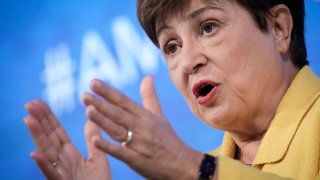
- The IMF's Managing Director Kristalina Georgieva told CNBC: "We don't yet see a significant slowdown in lending."
- Stressing that the world economy is in an "exceptionally uncertain environment, Georgieva said: "Pay attention to trends and be agile, adjusting — should the trends change."
- A majority of major global central banks, including the U.S. Federal Reserve, have tightened their monetary policy aggressively to tame soaring inflation.
The International Monetary Fund has yet to see enough banks pulling back on lending that would cause the U.S. Federal Reserve to change course with its rate-hiking cycle.
"We don't yet see a significant slowdown in lending. There is some, but not on the scale that would lead to the Fed stepping back," the IMF's Managing Director Kristalina Georgieva told CNBC's Karen Tso Saturday in Dubrovnik, Croatia.
We're making it easier for you to find stories that matter with our new newsletter — The 4Front. Sign up here and get news that is important for you to your inbox.
The Federal Reserve in a May banks report warned that lenders are worried about conditions ahead, as trouble in mid-sized financial institutions in the U.S. caused banks to tighten lending standards for households and businesses.
The Fed's loan officers added that they expect the issues to continue over the next year due to lowered growth forecasts and concerns over deposit outflows and reduced tolerance for risk.
Georgieva told CNBC: "I cannot stress enough that we are in an exceptionally uncertain environment. Therefore pay attention to trends and be agile, adjusting — should the trends change."
Money Report
The IMF's commentary on the pace of a slowdown in global lending comes after its Chief Economist Pierre-Olivier Gourinchas told CNBC in April that banks are now situated in a "more precarious situation" that would pose a risk to the international organization's world growth forecast of 2.8% for this year.
A majority of major global central banks, including the U.S. Federal Reserve, have tightened their monetary policy aggressively to tame soaring inflation. Meanwhile, the world's global debt has swelled to a near-record high of $305 trillion, according to the Institute of International Finance. The IIF said in its May report that high debt levels and interest rates have led to further concerns about leverage in the financial system.
'A little bit more'
As the IMF is yet to see a significant slowdown in lending that would prompt the Fed to reverse its course, Georgieva said that combined with a resilient U.S. jobs report on Friday, that it could hike further.
"The pressure that comes from incomes going up and in unemployment being still very, very low, means that the Fed will have to stay the course and perhaps in our view, they may need to do a little bit more," she said.
She projected the U.S. unemployment rate to go beyond 4%, up to 4.5%, from more rate hikes by the Fed after the rate rose to 3.7% in May, marking the highest since October 2022.
On the U.S. government passing a debt ceiling bill that was signed by President Joe Biden over the weekend, she said: "what has been agreed, in the context [that] it was agreed, is broadly speaking, a good outcome."
"Where the problem lies is that repetitive debate around the debt ceiling, in our view, is not very helpful. There is space to rethink how to go about it," she added.
— CNBC's Jeff Cox, Elliot Smith contributed to this report






